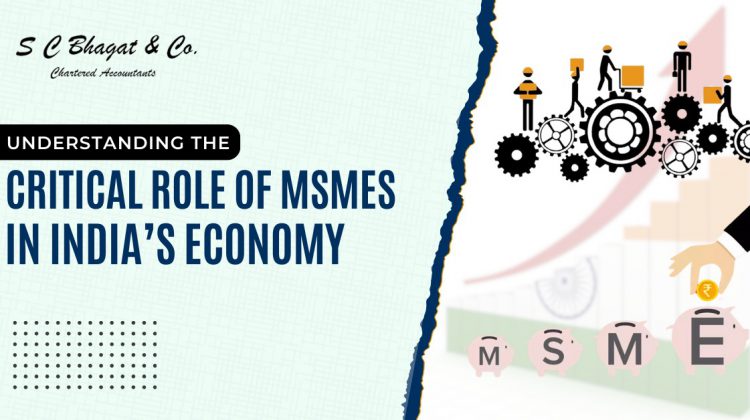Micro, Small, and Medium Enterprises (MSMEs) form the backbone of India’s economy, contributing significantly to the country’s GDP, employment, and exports. As a vital component of the industrial ecosystem, MSMEs drive innovation, foster entrepreneurship, and create opportunities for millions of individuals across urban and rural areas.
The Significance of MSMEs in India
1. Contribution to GDP
MSMEs play a crucial role in India’s economic landscape, accounting for nearly 30% of the GDP. Their diverse presence across sectors such as manufacturing, services, and trade has made them integral to the nation’s economic growth. These enterprises provide essential goods and services, often serving as suppliers to larger industries and contributing to the overall economic output.
2. Employment Generation
With over 63 million MSMEs in India, these enterprises are a major source of employment, particularly in semi-urban and rural areas. They employ over 110 million people, making them the second-largest job creators after agriculture. MSMEs not only offer jobs but also empower communities by fostering skill development and reducing regional disparities in income and employment.
3. Promoting Innovation and Entrepreneurship
MSMEs are hubs of innovation, often driving the development of new products, services, and processes. Their ability to adapt quickly to market changes and consumer demands gives them a competitive edge. This adaptability is crucial in a fast-evolving global market where innovation is key to staying relevant. Moreover, MSMEs encourage entrepreneurship, offering a platform for individuals to bring their business ideas to life.
4. Boosting Exports
MSMEs contribute about 48% of India’s total exports, making them a significant player in the global market. Their role in the export sector is vital, especially in traditional industries like textiles, handicrafts, and leather goods, where they hold a dominant position. By exporting a diverse range of products, MSMEs help improve the country’s trade balance and bring in valuable foreign exchange.
Challenges Faced by MSMEs
Despite their critical role in the economy, MSMEs in India face several challenges that hinder their growth and sustainability:
1. Access to Finance
One of the biggest challenges for MSMEs is accessing adequate and timely finance. Many small businesses struggle to secure loans due to stringent lending norms and lack of collateral. The high cost of credit also affects their ability to expand and invest in new technologies.
2. Regulatory Hurdles
MSMEs often find it difficult to navigate the complex regulatory environment in India. Compliance with multiple regulations, such as tax filings, labor laws, and environmental standards, can be overwhelming for small businesses with limited resources.
3. Technological Upgradation
Keeping pace with technological advancements is essential for MSMEs to remain competitive. However, many small enterprises lack the resources to invest in modern technology, which limits their growth potential and efficiency.
4. Market Access
Access to new markets, both domestic and international, is a significant challenge for MSMEs. Limited marketing capabilities, lack of brand recognition, and competition from larger players often restrict their market reach.
Government Initiatives to Support MSMEs
Recognizing the importance of MSMEs, the Indian government has implemented various initiatives to support and promote their growth:
1. Financial Assistance Schemes
Programs like the Prime Minister’s Employment Generation Programme (PMEGP), Credit Guarantee Fund Trust for Micro and Small Enterprises (CGTMSE), and the Micro Units Development and Refinance Agency (MUDRA) aim to provide easier access to finance for MSMEs. These schemes offer collateral-free loans and credit guarantees, enabling small businesses to secure funds for expansion and development.
2. Ease of Doing Business
The government has undertaken reforms to simplify the regulatory environment for MSMEs. Initiatives like the Udyam Registration Portal have streamlined the process of registering MSMEs, reducing paperwork and administrative burdens. Additionally, the Goods and Services Tax (GST) has helped standardize tax procedures, making compliance easier for small businesses.
3. Skill Development and Training
To enhance the capabilities of the MSME sector, the government has launched skill development programs such as the Skill India Mission and Entrepreneurship Development Programs (EDPs). These initiatives focus on upgrading the skills of the workforce and fostering entrepreneurial talent, ensuring that MSMEs can meet the demands of the modern economy.
4. Export Promotion
The government supports MSMEs in expanding their global footprint through schemes like the Market Access Initiative (MAI) and the Micro and Small Enterprises-Cluster Development Programme (MSE-CDP). These programs provide financial assistance for participation in international trade fairs, export promotion events, and market research.
The Future of MSMEs in India
The future of MSMEs in India is bright, with the potential to play an even more significant role in the country’s economic development. With continued government support, technological advancements, and increased access to finance, MSMEs can overcome existing challenges and achieve sustainable growth.
To unlock their full potential, it is essential to create an enabling environment that fosters innovation, reduces regulatory burdens, and provides access to global markets. By empowering MSMEs, India can achieve its vision of becoming a $5 trillion economy and ensure inclusive growth for all its citizens.
Conclusion
MSMEs are the lifeblood of India’s economy, driving growth, creating jobs, and fostering innovation. Despite facing numerous challenges, they continue to contribute significantly to the nation’s GDP and exports. With the right support and policies in place, MSMEs have the potential to propel India towards a more prosperous and equitable future.

